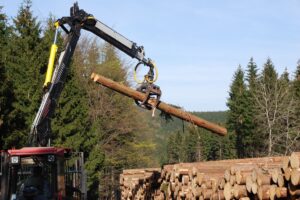Forestry is a sum of a lot of things being practised in natural and planted forests, whether public or private, that has positive effects on the maintenance and protection of the resources within its jurisdiction and the people within the community. It creates and protects in such a way that the forest flourishes, capable of supporting products and resources, wildlife, and livelihood, as well as providing a sustainable and renewable future, most especially in the midst of a changing climate that poses threats to our natural resources.
And since not a single person can do these things alone, a collective effort is necessary to be able to achieve the desired common goal. Hence, forestry organisations and companies are a crucial piece of the puzzle and have been during the long history of forestry in Australia. Farmers, forest professionals, scientists, educators, and the likes make up these organisations and companies and they manage, repair, protect, and conserve forests that benefit the environment and the community.
Government Forest Agencies
Australian Bureau of Agricultural and Resource Economics and Sciences
The ABARES is the Department of Agriculture, Fisheries and Forestry’s (DAFF’s) science and economics research division. It provides world-class and professionally independent research, analysis, and advice for decision-makers in both government and public sectors about anything related to the country’s forestry, agriculture, and fisheries industries. DAFF has offices in many locations across Australia, including Brisbane, Adelaide and Darwin to name a few. My good mate Dom who does the best pressure cleaning Bundaberg has to offer, says there is even in a DAFF office in his home town.
Its objectives include supporting policy-making that is evidence-based through providing research that is relevant to its policies and advising decision-makers about the challenges that the industry is currently facing and will face in the years to come. It also aims at promoting the findings in its websites, conferences, and other forms of media that the stakeholders’ needs, as well as developing and managing their manpower, processes, and the systems themselves, among others.
Commonwealth Scientific and Industrial Research Organisation

The CSIRO is the national science agency of Australia. Its purpose is to solve the greatest challenges of the country and improve the lives of its citizens and residents through innovative science and technology. These challenges include food quality and security, health and wellbeing, sustainable resources and energy, resilient and valuable environments, and development of future industries,
It started in 1916 as the Advisory Council of Science and Industry and has since provided a wide range of inventions that have positively impacted people’s lives not just in Australia but all around the world. Among these innovations include Aerogard, the CSIRO Total Wellbeing Diet, polymer banknotes, and even faster WiFi, among others.
Department of Agriculture, Fisheries and Forestry
This department aims to enhance Australia’s agricultural, forestry, and fisheries trade and industries, as well as manage any threat to the biosecurity of the country in order to protect its million-dollar value. It also aims to maintain the existing opportunities for agricultural export, as well as to provide opportunities to earn from them.
It engages with its international counterparts to strengthen the country’s involvement in shaping how the rest of the world’s agriculture and fibre industry approaches issues of food security, sustainability, productivity, and trade, not to mention climate change impact.
Department of Climate Change, Energy, the Environment and Water
The department spearheads the country’s response to sustainable energy use and climate change concerns, as well as the protection of the environment, water, energy, and heritage sites.
Some of its roles include driving climate action and investing in technologies that reduce emissions, managing the water resources of Australia for the benefit of the environment and communities, securing a reliable, sustainable, and inexpensive energy system, and supporting the management of sustainable natural resources, among others.
Organisations and Initiatives
Australian Forest Products Association
The forest products sector of Australia is a very important part of a more comprehensive industry under agriculture. AFPA is considered the top industry body nationwide that represents the entire forest product value chain that is comprised of resources, processes, and pulp and paper production.
It represents every element of the value chain, ranging from sustainable harvesting to various usage of natural forest resources which include but are not limited to establishment and management, harvesting and hauling, processing, and manufacturing. This means that its membership category falls under all four chambers, namely, Growers, Pulp, Paper and Bioproducts, Hardwood Processing, and Softwood Manufacturing.
Forest and Wood Products Australia
The FWPA is a federally-funded, not-for-profit industry services company and sometimes referred to as a Rural Research and Development Corporation or RDC where members pay basic industry levies and charges in order to fund research. It is only one of the 15 Australian rural R&D corporations and in fact, is nominated under the Forestry Research and Development and Marketing Act 2007 for industry-owned services company.
It collaborates with different governments and stakeholders in order to come up with strategies and invest only in relevant and effective research and development. It also aims to execute programs that are intended to expand wood and forest product markets, increase production and profits within the value chain, as well as make sure that all of the efforts can have positive effects on the environment and society.
Forestry Australia
This professional association is composed of over 1,200 farm foresters, forest scientists, and forestry professionals. Each and every member is very much committed to the organisation’s principles of sustainable, adaptive, and active forestry management and at the same time, applying them to yield environmental, social, and economic outcomes, regardless of the types of forests.
It welcomes any individuals who work as foresters, farm foresters, policy officers, scientists, or practitioners involved in the conservation of nature, land and resource management, communication, administration, research, and education as members.
Forest Stewardship Council Australia
The FSC is an international organisation that is non-governmental, which is devoted to promoting responsible forest management worldwide. It was founded in 1994 and has since emerged as the most respected and most extensive forest certification system globally.
Its pioneering certification process, now covering 200 million plus hectares of forests, helps consumers and businesses alike in choosing forest products that are made from materials that support responsible forestry. In other words, the certification provided by FSC ensures that the forest from which the products came from is managed in a way that ensures preservation of biological diversity and that the workers and local people benefit from the same. It also ensures the sustainability of the economic viability of the forest.




